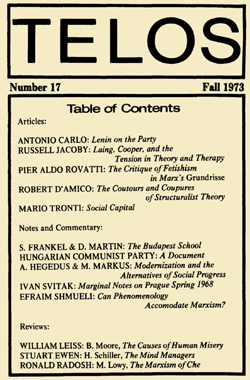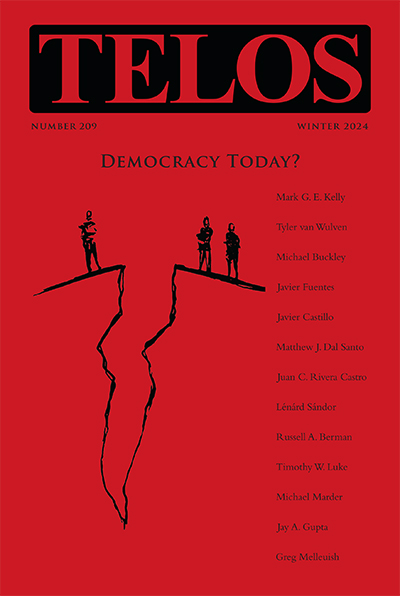As an occasional feature on TELOSscope, we highlight a past Telos article whose critical insights continue to illuminate our thinking and challenge our assumptions. Today, Frederick H. Pitts looks at Mario Tronti’s “Social Capital” in Telos 17 (Fall 1973). An earlier post on Tronti’s critique of trade unionism appeared on Friday.

In a previous post, I discussed Tronti’s critique of trade unionism. Here I investigate the suggestions Tronti offers as to how the complete integration of organized labor within the capitalist system can be surpassed in order to erect an effective working-class challenge against capitalist domination. Tronti begins his piece “Social Capital” by outlining the way in which fully developed capitalism witnesses the all-encompassing socialization of the class relation. The unorthodox and controversial appeal of Tronti’s text consists precisely in the way in which he treats class struggle not as some external hazard facing capitalism, but as an integral part of its operation as a system. The class struggle, far from posing a threat to capital, becomes a constitutive part of its reproduction, maintaining the collective capitalist and collective workers as clearly demarcated and, crucially, organized participants in the continuing success of the system. Trade unions, for Tronti, perform the valuable role of organizing workers as a working class so that they can assume their position in capitalist production.
Through the generalization of the social relation from which capital gains its power, it is capital that holds the most general social stake in society, and the workers only a partial interest. With the socialization of capital, and the subsumption of all social relations under its spell, capital becomes “the representative of the general interest” (118). The partial interest of the workers is motivated by necessity. In order to resist capital, Tronti suggests that workers must oppose themselves to its “sociality.” This means throwing off the shackles of traditional socialism, whereby workers struggled to show themselves and the society they espoused as more social than the supposedly asocial capitalist system against which they stood: “Workers no longer have to contrapose the ideal of a true society to the false society of capital” (ibid.). Indeed, the socialization of capital itself does not promise the revolutionary opportunity some thought it would, and the formation of a class struggle between workers and capitalists presents not a potentially terminal contradiction but a constitutive cornerstone of the whole system. This absolves workers of the requirement to “release and dilute themselves within the general social relation” so as to play a part in the whole sorry charade. Rather, what is needed is the rediscovery by the working class of their status as an “anti-social revolutionary force” (ibid.). What could be called an “anti-social socialism” does not take the side of society against capital, of the social against the acquisitive and the competitive. Capital itself has co-opted the first terms of these two binaries. Rather, Tronti’s anti-social socialism suggests that what is necessary is to pose a set of partial, sectorial interests and demands in contradistinction to the social generality of those of capital:
Today, without possibility of mediation, the whole society of capital stands in front of the working-class. The relation is finally reversed: the only thing that the general interest cannot mediate within itself is the irreducible partiality of the workers’ interest. Hence, we have the bourgeois call to social reason against the sectorial demands of the workers. (ibid.)
Tronti’s definition of “partial” invites a different impression to that intended. One might imagine that “partiality” is opposed to “totality.” However, later, it is indicated that what is meant is “partiality” as the binary of impartiality, an one-sidedness that projects a single, true working-class standpoint against that of capital. However, for a number of reasons, this partiality-against-impartiality proves inadequate. Tronti recommends that the partiality of the workers as against the sociality of capital be attained by means of the cultivation of a “rigorously working-class viewpoint” (120). Tronti’s main objection is to the phrasing of revolutionary demands in terms of a “general interest,” rhetoric of which stripe would only serve to play into the capitalist project of socialization, and further “inscribe the working class within the development of capital” (ibid.). Instead, the partial, one-sided demands forged from the working class viewpoint should be those that motivate revolutionary change.
As Tronti touches upon, it is capitalism that is a collective force stacked against the workers, rather than the opposite picture held on to so doggedly by generations of rebellious proletarians and their bourgeois hagiographers. Tronti contends that not only must sociality and collectivity themselves be disavowed, but so too must the reason and rationality of capitalist production that has been enforced with the complicity of the trade union movement. The anti-social socialism that Tronti infers is necessary must also be an irrational and unreasonable anti-social socialism, which unleashes the “anarchy” stymied and controlled by the trade unions on behalf of capitalist regulation, with its aim “the systematic disorganization of production” (119), rather than the transfer of management of the same economic system from the hands of capitalists to those of workers. Tronti writes that
when collective labor agrees to reasonably participate in the general development, it ends up by functioning as just another part of collective social capital. On this road the only thing attainable is the most balanced and rational development of all of capital. It is at this point that the working class must instead consciously organize itself as an irrational element within the specific rationality of capitalist production. The growing rationalization of modern capital must find an insurmountable limit in the growing unreasonableness of organized workers, i.e. in the workers’ refusal to political integration within the economic development of the system. Thus, the working class becomes the only anarchy that capitalism fails to socially organize. The task of the labor movement is to scientifically organize and politically manage this labor anarchy within capitalist production. [I]t is not a matter of creating chaos within the productive process. It is a matter of “organizing the systematic disorganization of production.” (118–19)
Thus, disorganization and anarchy must be organized against capital. The recommendation that Tronti makes for how this organization might be achieved is surprising in the context of the enthusiasm with which he has spent the last few thousand words celebrating the explosive anarchy of the working class, and marks an ultimately disappointing and exasperating finale to an piece seemingly intent on slaying numerous sacred cows. The working class’s “objective” anarchy can only be channeled effectively through the Leninist party machine, Tronti suggests.
The organizing of workers into a collective entity under the auspices of organized labor presents itself as an aid rather than an obstacle to capital. Due to the fact that “[c]ollective capital now needs to have before itself collective labor for the economic calculation of its own planned development” (113), it might be inferred that workers should seek to escape their reduction into members of an easily-manageable class body. They are victims of what Tronti labels “a process which tends to reduce everyone who works to a worker” (115); the only working class here is that organized by capital. In the final analysis, it seems that Tronti’s prescription for how this may be overcome is nowhere near radical enough, merely providing capital with yet more ready-made workers with which to populate its social relation.
Read the full version of Mario Tronti’s “Social Capital” at the Telos Online website. If you are affiliated with an institution that is an online subscriber to Telos, you have free access to our complete online archive. If not, you can purchase 24-hour access to this and other Telos articles at a per-article rate. Follow the article link for more details.



